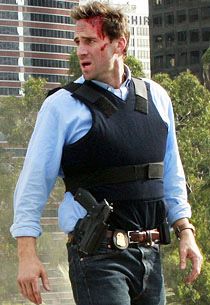Last night, a kind of amazing thing happened. For the first time in five years, reality TV sensation "Survivor" was not the highest rated show among 18- to 49-year-olds at 8pm. That honor went to the series premiere of David Goyer's new sci-fi/drama, "FlashForward." The show rocked the hour with 12.4 million viewers overall, and specifically high ratings in key target demographics. A brief review of the episode and why it's earned its spot after the jump.
It's hard not to like the pilot of "FlashForward" for one simple reason: the concept is simply cool. The show takes place in a reality in which the entire world has blacked out simultaneously, and each individual sees a flash of his or her future while unconscious (or, if we're splitting hairs, alternately conscious). Everyone flashes forward to the exact same date and time roughly six months in the future; planned, no doubt, to coincide with the season's final few episodes.
As one might imagine, this premise sets up a heavy burden on the show's writers. We already know, after just an episode, exactly where all the key characters must be by the finale, and exactly how they'll feel. So many open ends are left after only one hour that closing all of them in 22 episodes seems unfathomable.
In his flash forward, our hero Mark Benford, an FBI agent, sees himself working on a breakthrough in the very cause of the flash forward. He reports his vision to his boss, and it becomes the basis for the start of an investigation. I think the problem in this is pretty evident: if the investigation of this event is founded on a vision from within the event itself, is there any real solid basis for believing any resulting leads? And for that matter, if everyone knows what they'll be doing in six months, can simply knowing this cause them to alter their outcomes? Or is this future all the more possible because it's seen in advance? All these questions are hinted at within the pilot, but not tackled in hair-wrenching detail (thank god!). Agonizing over specifics is left for the audience to do in their spare time.
There are few issues to speak of after only one episode. In an earlier article, I made some disparaging comparisons to the "Lost" premiere, which still stand. In addition, because the show seems to have only one tone--grim--at least that we've seen so far, the acting feels a little overdone after an hour of heavy stares and loaded conversations. And finally, there are lots of open ends to tie up. But I see this last concern as less of a flaw, and more of a reason for me to tune in next week.
The pilot's title, "No More Good Days," refers to a line Mark's daughter says about her flash forward: simply that there will be "no more good days," but no specifics on her vision. She refuses to share it with her father when he asks at the end of the episode, and I'm inclined to think what she saw will become pivotal later on in the season. Thoughts? Agreements? Issues? I know it's a little early, but lets open the floodgates for speculation. Surely somebody has a theory about that kangaroo...
And if you missed the premiere last night, you can catch in online on ABC's website.


.jpg)
.jpg)
